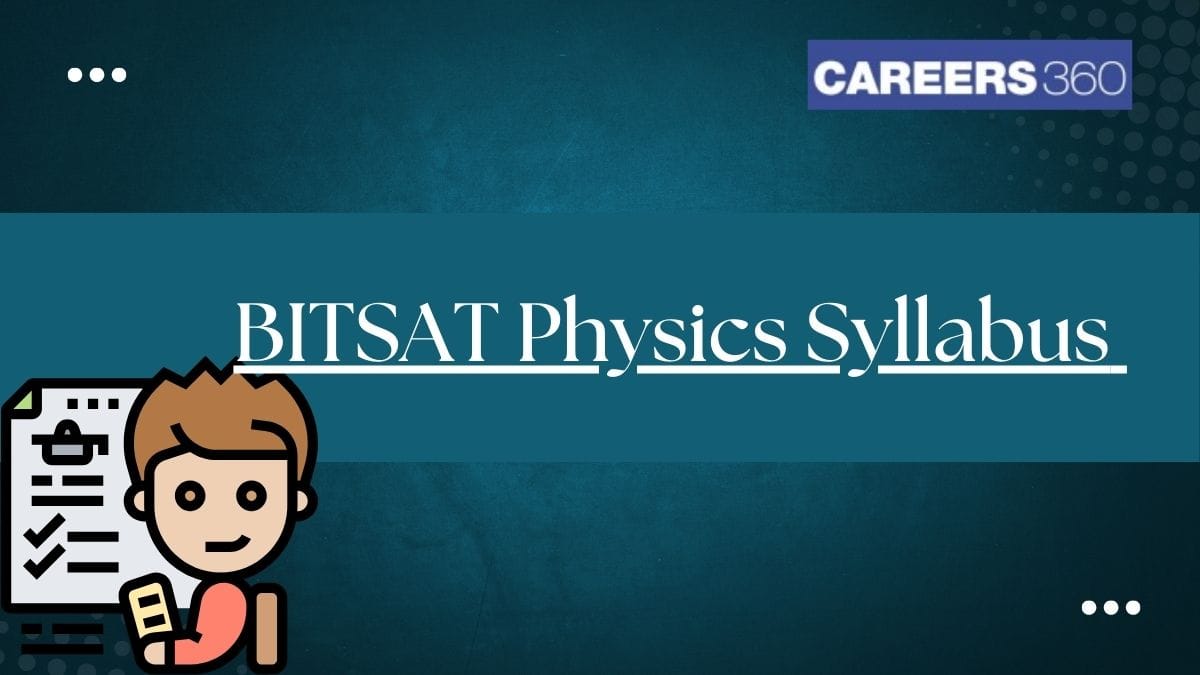BITSAT Physics Syllabus 2026 (Out): Chapter-Wise Topics, Weightage & PDF
BITSAT Physics Syllabus 2026 - BITS, Pilani has published the BITSAT 2026 physics syllabus on the website, bitsadmission.com. The BITSAT syllabus is based on the class 11 & 12 syllabus. The question paper will be prepared according on the BITSAT 2026 syllabus. The physics exam pattern includes 30 questions from Class 11 and 12 NCERT-based topics, such as mechanics, electrostatics, modern physics, and more. Candidates must be familiar with the BITSAT syllabus while preparing for the exam. Along with the syllabus, candidates must also be familiar with the BITSAT exam pattern. The authority will conduct the BITSAT 2026 exam in two phases in online mode. The session 1 exam will be held from April 15 to 17, 2026, while Session 2 will be conducted from May 24 to 26, 2026.
Direct link to download the BITSAT 2026 physics syllabus

BITSAT Physics Syllabus 2026
Unit | Topics Covered |
|---|---|
Systems of units (SI, fundamental & derived), Dimensional analysis, Significant figures, Precision, Fundamental measurements (Vernier callipers, screw gauge, physical balance) | |
Kinematics | Vectors, Position/velocity/acceleration vectors, Motion with constant acceleration, Projectile motion, Uniform circular motion, Relative motion |
Newton’s Laws of Motion | Laws of motion, Free body diagrams, Motion on inclined plane, Pulley systems, Circular motion (centripetal force), Inertial & non-inertial frames |
Impulse & Momentum | Impulse, Momentum conservation, Collisions, System of particles, Center of mass |
Work & Energy | Work-energy theorem, Kinetic & potential energy, Power, Conservative forces, Mechanical energy conservation |
Rotational Motion | Angular displacement/velocity/acceleration, Rotational kinematics, Moment of inertia (theorems), Torque, Angular momentum, Conservation of angular momentum, Rolling motion |
Newton’s law, Gravitational potential energy, Escape velocity, Planetary motion, Kepler’s laws, Satellite motion | |
SHM, Spring-mass system, Pendulum, Forced & damped oscillations, Resonance | |
Mechanics of Solids & Fluids | Elasticity, Pressure, Density, Archimedes’ principle, Viscosity, Surface tension, Bernoulli’s theorem |
Progressive waves, Standing waves (strings & pipes), Superposition, Beats, Doppler effect | |
Heat & Thermodynamics | Kinetic theory, Thermal equilibrium, Specific heat, Heat transfer (conduction, convection, radiation), Newton’s law of cooling, First law of thermodynamics, Second law, Carnot engine |
Electrostatics | Coulomb’s law, Electric field, Potential & energy, Gauss’ law, Electric dipole, Capacitance & dielectrics |
Ohm’s law, Joule heating, Resistors & cells (series/parallel), Kirchhoff’s laws, Potentiometer, Wheatstone bridge, Resistivity & temperature dependence | |
Magnetic Effect of Current | Biot-Savart’s law, Ampere’s law, Lorentz force, Force on current conductors, Magnetic moment, Torque on current loop, Galvanometer (conversion to voltmeter/ammeter) |
Electromagnetic Induction & AC | Faraday’s law, Lenz’s law, Eddy currents, Self & mutual induction, Transformers, Generators, Alternating current (rms & peak values), LCR circuits |
Optics | Reflection & refraction, Lenses & mirrors, Optical instruments (microscope, telescope), Huygens principle, Young’s double slit experiment, Interference in thin films, Single-slit diffraction, Electromagnetic spectrum, Polarisation (Malus’ law, Brewster’s law) |
Modern Physics | Dual nature of matter & light, Photoelectric effect, De Broglie wavelength, Rutherford & Bohr atomic models, Hydrogen spectrum, Radioactivity, Nuclear fission & fusion, Binding energy |
Electronic Devices | Energy bands in solids (conductors, insulators, semiconductors), Semiconductor diode (I-V characteristics, rectifier), LED, Photodiode, Solar cell, Zener diode (voltage regulator), Junction transistor (CE configuration – amplifier & oscillator), Logic gates (OR, AND, NOT, NAND, NOR), Transistor as a switch |
BITSAT Physics Chapter-wise Weightage
The BITSAT 2026 chapter-wise weightage for physics is helpful for candidates to plan their exam preparation. Candidates can check the topic-wise weightage from the table below.
BITSAT Physics Chapter-wise Weightage
| Physics Topics | Weightage |
|---|---|
Heat & Thermodynamics | 10% |
Magnetic effect of current and magnetism | 9% |
6% | |
6% | |
5% | |
5% | |
5% | |
Fluids | 5% |
Rotational Motion | 4% |
Work, Energy, Power | 4% |
4% | |
4% | |
Units, Dimension, Errors | 3% |
Gravitation | 3% |
Alternating Current | 3% |
Frequently Asked Questions (FAQs)
The BITSAT physics difficulty level is moderate to difficult.
High-weightage topics in BITSAT Physics 2026 include:
Electrostatics
Current Electricity
Oscillations and Waves
Magnetism
Modern Physics
Optics
The BITSAT 2026 exam will be held from April 15 to 17, 2026, and the Session-2 exams will be held from May 24 to 26, 2026.
Popular Courses and Specializations
List of colleges accepting BITSAT
Browse Engineering Colleges by State
Questions related to BITSAT
On Question asked by student community
Hello aspirant,
BITSAT syllabus for Btech covers physics Chemistry, Mathematics (biology for Pharmacy), English proficiency and logical reasoning. Also includes NCERT syllabus like Testing core concepts in Mechanics, Thermodynamics, Chemical bonding, Calculus and Critical thinking. And also topics include like kinematics, Electrostatics, Organic Chemistry, Algebra, Grammer and Pattern recognition. It
Since you're from Delhi and have already registered for JEE, BITSAT, VITEEE, and CUET, consider these additional exams: SRMJEEE (SRM Institute of Science and Technology), COMEDK UGET (for Karnataka engineering colleges), WBJEE (West Bengal Joint Entrance Examination), AEEE (Amrita Entrance Examination for Amrita Vishwa Vidyapeetham), KIITEE (Kalinga Institute of Industrial
Hello,
For BITSAT 2026, the approximate weightage across subjects is often given as:
Mathematics: ~ 40 %
Physics: ~ 30 %
Chemistry: ~ 25 %
English + Logical Reasoning: ~ 10 % combined
To know the syllabus and questions Check the follwing link,
https://www.careers360.com/exams/bitsat
Kindly check the below link to
Hello,
If you are looking for colleges with good placements other than through JEE or BITSAT, you can consider private and state-level engineering colleges that conduct their own entrance exams or accept board exam scores. Many of these colleges have strong industry connections and placement cells that help students get
Hello Aspirant,
From your BITSAT score of 210, BITS Hyderabad entry supports a very focused choice of integrated M.Sc. (like M.Sc. Physics, Chemistry, Mathematics, Economics or Biology). Generally with this score, admission into the M.Sc. programs at BITS Hyderabad is likely competitive. Based on past trends, the cutoff's for the
